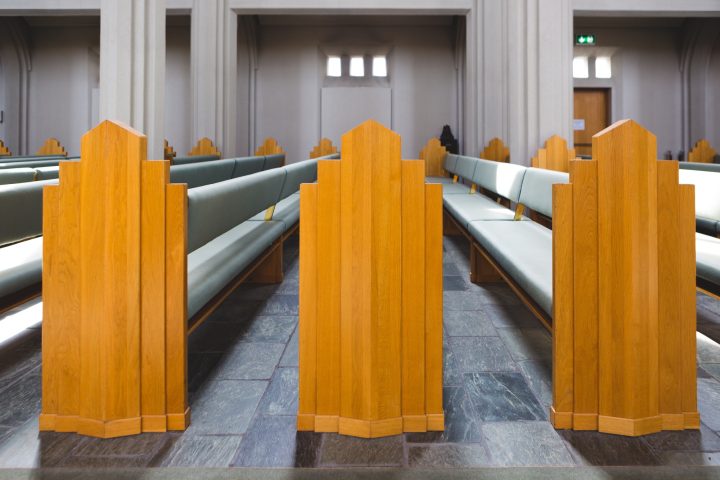by Mason Puckett
A Very Ancient Programming
We who are in a position of power are indebted to bear up the weakness of those in a position of powerlessness. Welcome one another as Christ has welcomed you. This is Paul’s relentless challenge to the Roman church (Romans 15:1-13). There’s an uneven power dynamic in the church and Paul just isn’t having it. This discrepancy is especially present in the difficult, fractured practice of table fellowship (explored throughout Romans 14). The Jewish Christians and gentile Christians of the…
Grace Is Scary
“For this reason the promise depends on faith, in order that it may rest on grace, so that it may be guaranteed to all his descendants, not only to the adherents of the law but also to those who share the faith of Abraham, who is the father of all of us.” – Romans 4:16 I hear from time to time a comment along the lines of, “I feel like I didn’t hear much preaching about grace when I was…
An Act of Memory
Luke 15. The parable of the Prodigal Son. This is Jesus’ idea of fatherhood – to create belonging and safety for those coming home to you, to practice outrageous (even scandalous) generosity toward your kids even in, especially in, their failures. The prodigal son, after messing up so badly, is prepared to relinquish his status as his father’s son. He believes the worst about himself. He works up a whole recital of his sins to offer his dad. But halfway…
To Fall out of Love
Anyone who does not hate their family cannot be my disciple. Anyone who will not carry their cross cannot be my disciple. Anyone who does not part with all their possessions cannot be my disciple. This is the triple warning we hear from Jesus in Luke 14:25-33 as a crowd of enthusiasts swells around him. And blessed are those who are troubled by this warning! Blessed are those who do not rush to sanitize the difficult teachings of Jesus. Listening…
Get Into the Story
In Luke 13, there is a woman hunched over for the last eighteen years who meets Jesus in a synagogue. Calling her over to himself, Jesus says, “Woman, you are set free from your ailment.” And just like that, “she stood up straight and began praising God.” Well, all this happens on a Sabbath day, which makes the synagogue leader feel the need to stand up and protest. “Come on one of the other six days of the week to…
One More Year
There is a vineyard and the man who owns it. There is a fig tree and the gardener who tends to it. The fig tree was planted three years ago and has yet to bear any fruit at all. The owner wants it gone. Three years is plenty to expect some results. Why should it waste the soil? Why not plant something else in its place, something with the potential to produce fruit? The vineyard owner has been patient enough.…
Bothering to Notice
Keep your lamps lit, Jesus says in Luke 12. Be like servants in the house whose boss is set to return tonight. Maybe the boss will return in the evening. Or maybe it will be the middle of the night. Or maybe it will be nearly sunrise. Whatever the case may be, the servants’ patient watchfulness will be rewarded when he finally comes home. He’ll be so happy with them that he sits them down at the table and serves…
It All Yields
A funeral. A widow. A mom with no son now. This is the scene in the town of Nain when Jesus enters (Luke 7:11-17). As soon as Jesus shows up, Luke immediately tells us everything that is disheartening about this mourning mom’s situation. She’s already buried her husband. Now she’s burying her only son. In this ancient context, a woman was typically reliant on the man in her life for economic stability. In the absence of her husband, she would…
To Fall into His Gravity
A new Exodus! God’s people have been freed from sin and death. We have trekked our baptismal path through Jesus’ death and resurrection and have arrived at newness of life, no longer enslaved to sin (Romans 6:1-14). But Paul isn’t finished yet, and this discussion of freedom from our slavery to sin is about to take a strange turn. To belong to Christ is to be freed from the enslaving gravity of sin. However, Paul still describes our new, baptized…
New Exodus
I don’t know about you, but I experience a bit of whiplash when reading Romans, especially chapters 5-6. Paul is doing such a masterful job of defining for us reality as it really is. Reality according to Romans 5-6 is this: God is perfectly at peace with us and perfectly reconciled to us. Grace has defeated (humiliated!) sin and death. Baptism has immersed us into the death and new life of Jesus. What it means for us to be human…
Don’t You Know?
How much time do we spend being disappointed in ourselves for not being able to move past our old and tired ways of thinking, speaking, and behaving? We desire to think, speak, and behave in ways that belong to a new way of being human, and we are regularly discouraged that it’s not happening sooner. Except, it is happening, nay, already did! Paul in Romans 6 makes an astonishing, impossible declaration. “We who died to sin cannot go on living…
But Grace
When we read Romans 5, it’s like sin is a spreading sickness and Adam is patient zero. To exist under the power of sin is simply an undeniable part of what it means to be human. It’s been in our DNA since the first human being. And where there is sin, death is nearby. Death is sin’s partner, the great sign that God’s project of breathing new life into existence has been contaminated. Sin and death have “reigned,” says Romans…











